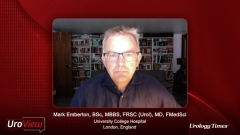
Prevention and Mitigation of Focal Therapy-Related Side Effects
An experienced clinician shares his personal experience with preventing and managing side effects related to focal therapy in patients with clinically localized prostate cancer.
Episodes in this series

Mark Emberton, BSc, MBBS, FRSC (Urol), MD, FMedSci: I think the absence of serious adverse events, and this is really important. And actually, one of the big observations to make of the focal therapy series and the trials is the very, very low rate of serious adverse events. I mean, really low. It is largely due to fantastic engineering and safety critical design of the technologies. And with the solar blade system that I use, I have lots of ways of monitoring the prostate to alert me to movement. I have ways of monitoring the rectal mucosa to make sure that it's not overheating. And there are alarms that will trigger if any of the thresholds are exceeded. And provided you use the equipment in the way that it's meant to be used and that's easily taught, you can then rely on the extraordinary engineering to keep you free of clinically significant toxicities. By that I mean incontinence by treating the sphincter which should never happen because you can visualize it. And getting a rectal injury which again should never happen because again you can visualize it. The rectal injuries that I've had, have been related to men who've had previous radiotherapy, and they tend to occur late. And they, I think it's fair to say they all occurred using whole gland treatment, so not focal treatment. So this is before we had MRI and we were treating the whole prostate. And there were individuals who were being treated at that time with external beam and brachytherapy that had recurred, and we were treating because there weren't many other options available to them. And they tend, they tended if they did develop a fistula tended to occur quite late. So at two to three months afterwards. And it was a midline necrosis of essentially what must have been a very poorly vascularized anterior rectal wall. That really doesn't happen anymore with focal treatment. Or it happens so infrequently as to not be an issue. And I think the reason for that is that we're only treating a small amount of prostate, and we're, and as a result we don't compromise the poor vascularity of an anterior rectal wall that's received a high dose of radiation therapy. The other thing that used to happen, and this is difficult from the literature because if one looks up HIFU or cryo and one goes back, the early experience and many of the cases that exist in the reviews are not separated from whole gland to focal. And we all started doing whole gland. And there was a completely different spectrum of complications with whole gland treatment some of which I've alluded to already. But the other one was stricture rates. And so when I was doing whole bland therapy, so I started doing HIFU in 2004 I think. December 2004 was my first case. And we did whole glands until we could rely on MRI. It was quite common for me to have a case of a stricture, of a patient who developed a stricture on the list. So there was about a ten 15 percent chance of developing a stricture. These were difficult strictures to treat and that they were, and they were just distal to the external sphincter and required very careful management. And some did recur and needed subsequent treatment. But they've gone away completely with focal therapy because we're not creating a surrounding area of necrosis resulting in a scar that is, that goes around the urethra. And I don't think we've had a single stricture event actually. That can't be right. We must have had one or two. But it's a very rare occurrence now. So what is remarkable when you start out, provided you do it, you do the focal treatment in the way that I've described, is that the patients have a very uncomplicated recovery. They go home the same day. They’re continent when the catheter comes out at day two or day three. They're voiding well. The erections will come back in the first week or two. Obviously the ejaculation will be bloody initially et cetera. But they get back to activities really rather quickly. And it's really quite rare to have any emergency calls because of a problem. Again compared to whole gland treatment, the course of recovery of focal treatment is of a completely different profile and magnitude.
Newsletter
Stay current with the latest urology news and practice-changing insights — sign up now for the essential updates every urologist needs.







